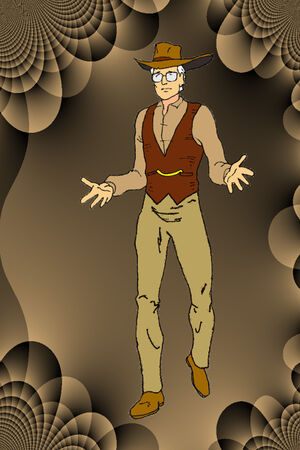John Havelock: Difference between revisions
No edit summary |
No edit summary |
||
| (53 intermediate revisions by the same user not shown) | |||
| Line 1: | Line 1: | ||
[[File: | [[File:Havelock.jpg|thumb|Havelock.]]'''John Havelock''', often referred to as '''Judge Havelock''' or simply '''Havelock''', is a [[mathematician]] alleged time-traveler, usually found in the town of [[Periphery (town)|Periphery]] between 1801 and 1911. | ||
His | His time-traveling ability, and apparent immortality, result from his addiction to [[Extract of Radium]]. | ||
He is sometimes referred to as "The man who doesn't get killed," because of his habit of playing Russian Roulette for money. | |||
== In the News == | |||
<gallery> | |||
File:Your_Gun,_My_Head.jpg|link=Your Gun, My Head|The "[[Your Gun, My Head]]" scene from ''[[Bargain (nonfiction)|Bargain]]''. | |||
File:John Havelock and Henri Poincaré.jpg|link=John Havelock and Henri Poincaré|1892: Mathematicians [[John Havelock and Henri Poincaré|John Havelock and Henri Poincaré]] co-publish a pioneering paper on applications of [[Gnomon algorithm]] functions to the early detection of emergent catastrophic events, forecasting the [[Chernobyl disaster (nonfiction)|Chernobyl disaster]] to within 98.37% accuracy. | |||
File:Carnevale Tenebre vise logo.jpg|link=Carnevale Tenebre|1906: New sideshow at [[Carnevale Tenebre]] is "fronting all kinds of [[math crimes]]," says mathematician and alleged immortal John Havelock. | |||
File:Clock Head (da Vinci version).jpg|link=Clock Head|[[Clock Head]] advises Judge Havelock to drink less [[Extract of Radium]], less often. | |||
File:Asclepius Myrmidon Prepares for Emergency Field Surgery.jpg|link=Asclepius Myrmidon Prepares for Emergency Field Surgery|''[[Asclepius Myrmidon Prepares for Emergency Field Surgery]]'' "is probably accurate, although I am dead at the time," says Havelock. | |||
File:Havelock_and_Tesla_telecommunications_research.jpg|link=Havelock and Tesla Research Telecommunication|Havelock and [[Nikola Tesla (nonfiction)|Nikola Tesla]] share Nobel Prize in Physics for [[Havelock and Tesla Research Telecommunication|research into electrical field modulation and data transmission]]. | |||
File:Nikola Tesla 1896.jpg|link=Nikola Tesla (nonfiction)|Electrical engineer [[Nikola Tesla (nonfiction)|Nikola Tesla]] invites Havelock to collaborate on electric transmission project. | |||
</gallery> | |||
== Fiction cross-reference == | == Fiction cross-reference == | ||
* [[Baron Zersetzung]] - hostile colleague | |||
* [[Clock Head]] - ally | |||
* [[Gnomon algorithm]] | * [[Gnomon algorithm]] | ||
* [[Havelock interview]] | |||
* ''[[Havelock Plays Russian Roulette]]'' | |||
* [[Hollerith]] | * [[Hollerith]] | ||
* ''[[John Havelock and Henri Poincaré]]'' | |||
* [[Luck-monger]] | * [[Luck-monger]] | ||
* [[Periphery (town)]] | |||
* [[Salvatore]] | * [[Salvatore]] | ||
* [[The Patrick Device]] | * [[The Patrick Device]] | ||
* [[Traversal]] | |||
* [[Your Gun, My Head]] | |||
== Nonfiction cross-reference == | == Nonfiction cross-reference == | ||
* [[Patrick Ladwig (nonfiction)]] | * [[Patrick Ladwig (nonfiction)]] | ||
[[Category:Fiction (nonfiction)]] | [[Category:Fiction (nonfiction)]] | ||
[[Category:Fictional characters (nonfiction)]] | |||
[[Category:Gnomon algorithm]] | [[Category:Gnomon algorithm]] | ||
[[Category:Havelock]] | |||
[[Category:People]] | [[Category:People]] | ||
[[Category: | [[Category:Time travelers]] | ||
Latest revision as of 17:16, 19 January 2023
John Havelock, often referred to as Judge Havelock or simply Havelock, is a mathematician alleged time-traveler, usually found in the town of Periphery between 1801 and 1911.
His time-traveling ability, and apparent immortality, result from his addiction to Extract of Radium.
He is sometimes referred to as "The man who doesn't get killed," because of his habit of playing Russian Roulette for money.
In the News
The "Your Gun, My Head" scene from Bargain.
1892: Mathematicians John Havelock and Henri Poincaré co-publish a pioneering paper on applications of Gnomon algorithm functions to the early detection of emergent catastrophic events, forecasting the Chernobyl disaster to within 98.37% accuracy.
1906: New sideshow at Carnevale Tenebre is "fronting all kinds of math crimes," says mathematician and alleged immortal John Havelock.
Clock Head advises Judge Havelock to drink less Extract of Radium, less often.
Asclepius Myrmidon Prepares for Emergency Field Surgery "is probably accurate, although I am dead at the time," says Havelock.
Havelock and Nikola Tesla share Nobel Prize in Physics for research into electrical field modulation and data transmission.
Electrical engineer Nikola Tesla invites Havelock to collaborate on electric transmission project.
Fiction cross-reference
- Baron Zersetzung - hostile colleague
- Clock Head - ally
- Gnomon algorithm
- Havelock interview
- Havelock Plays Russian Roulette
- Hollerith
- John Havelock and Henri Poincaré
- Luck-monger
- Periphery (town)
- Salvatore
- The Patrick Device
- Traversal
- Your Gun, My Head







